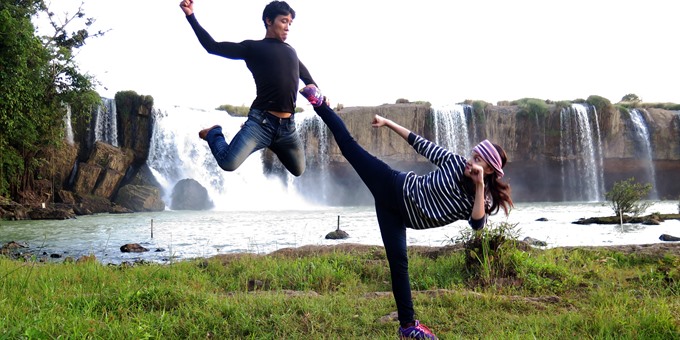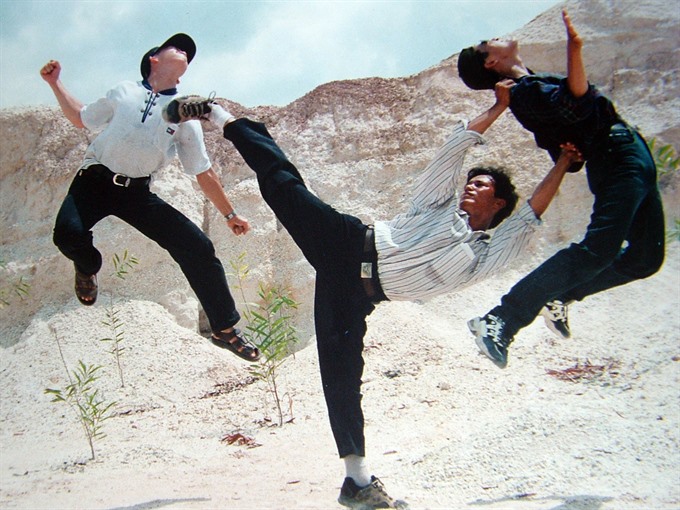 Life & Style
Life & Style

Stunt performance has been present in Việt Nam for some decades, yet given the risks stunt performers take and efforts they make, this profession seem yet to be recognised properly.
 |
| Take that: Stuntwomen are at a disadvantage compared to stuntmen, but they are as important to the success of an action movie. –Photo Courtesy of Quoc Thinh |
Its an ‘unwanted’ and thankless job, but without stuntmen and stuntwomen, no action movie can make the cut, writes Hồng Vân
Over the last two or three decades, alongside the exploding popularity of made-in-Viet Nam action movies, the need for people to perform stunts has risen accordingly.
However, given the risks the stunt performers take, they get very little public acknowledgement or praise.
Worse still, they do not get the protection that a high-risk profession demands. For instance, the stunts can put their lives at risk, but they have no insurance in Việt Nam.
24-year-old Đặng Phi Long from HCM City is a professional stuntman. Over the last eight years, he has performed in nearly a hundred movies.
“I still remember clearly the first time I was part of a burning sequence. From the moment I was set on fire, every single second became incredibly slow. I could hear the my own heart beat at that time and was worried sick if people would save me in time," Long said.
“Each dangerous action is a memorable experience, both scary and thrilling.”
(9)37324135PM.jpg) |
| Taking risks: Performing stunts means constant exposure to accidents, but these artists can’t get proper insurance in Việt Nam. –Photo Courtesy of Quoc Thinh |
Long has jumped through glass doors six times. Twice, shards of broken glass tore his hands and made him bleed profusely, but he takes such things in his stride.
“Accidents in this profession are unavoidable,” he said.
Quốc Thịnh, another professional stuntman with 24 years of experience, said: “Accidents in stunt performances are more common than in other professions. Accidents can happen both during practice and the actual acting session. It may range from the minor cuts and sprains to getting burned or having legs and arms broken and even more serious injuries.”
Since 1997, Thịnh has been running a centre providing training for those who want to pursue this dangerous career. The centre has forty trainees at present.
Like Long, other students of Thịnh including stunt artist Phi Ngọc Ánh, Kim Dung and Thảo Lê have all experienced accidents on the job.
In Tiger Dream, Ánh had her hands torn and bled when swinging on a rope at a height of 15 metres without any protective equipment. In another movie directed by Quốc Thịnh, Ánh jumped from the third floor and broke her scapula. Kim Dung had her chin bruised badly in fighting scene with her co-actors.
“Stuntwomen are at a disadvantage compared to stuntmen. There are less job opportunities and their physical capacity is lower than men’s on average,” said Thịnh.
 |
| Air-borne: In Việt Nam, stunt performers have to be versatile to get reasonably stable employment.–Photo Courtesy of Quoc Thinh |
Uninsured risk takers
“Being exposed to the risk of accidents but not having insurance is the biggest issue of concern for people in this profession,” said Thịnh.
Currently, Vietnamese stunt performers are only covered by normal insurance plans. In many cases, the low payout fails to meet the actual expense incurred in treating the injuries, he added.
Producer and actress Trương Ngọc Ánh is among very few professionals in Việt Nam to buy insurance for actors and stunt persons who performed for the action movie Truy sát (Chasing).
Ánh had been part of many action movies and experienced some accidents while acting; so, as a producer, she found insurance essential for both actors and those who performed stunts, Ánh said at a press conference.
“Actors, not only in Việt Nam but also in other countries, face accidents while doing action scenes. The important thing is how to minimize these risks,” said Ánh.
Actors and stunt performers in Việt Nam have to find ways to protect themselves from risks with extensive training and practice.
“Normally, we study the script, discuss with director the dangerous sequences and then have to prepare equipment on our own to avoid injuries. For example, when we jump from high floors, we have to fetch mattress to minimise injury. The best way to avoid risk is to practise carefully before the sequence is shot, but no one can guarantee that an accident will not happen,” said Hồ Hiếu.
 |
| Trading blows: In Việt Nam, those who want to perform stunts have to depend on informal training and practising with experienced and professional artists. –Photo Courtesy of Quoc Thinh |
Besides the insurance problem, Thịnh said, "performing stunts is a tough profession which requires more than just a good physique and martial arts skills."
“Some people may take only two years, and others may take five to become a pro. Like acting, it requires aptitude and a sense of art,” he added.
"Regular practice is a must for stunt performers. It makes the scene look real and persuasive and can limit accidents," said Thịnh.
In Việt Nam, there is not much scope for specialising in stunts. You cannot be someone who does only fire scenes, for instance, or jumps or vehicle scenes for that matter. Stunt performers have to be able to do multi tasks like performing with fire, vehicle crashes/ jumps, fight sequences to have contracts with producers. Those that try to do this, have to depend on other jobs to make ends meet.
There are about 300 stunt performers in HCM City, according to the HCM City Cinema Association. Among them, just a third are professionals.
There is no training school for this vocation. Those who are interested take informal training and learn from more experienced and professional stunt artists.
In 2009, a former official of the HCM City Cinema Association, Nguyễn Văn Đây, planned to establish an association of stunt performers to present a collective voice for the artists’ rights and benefits, but it did not come to pass.
“This is a risky profession. People perform scenes that actors cannot or do not dare to. But the benefits that stuntmen get do not match their efforts, the risks they face,” said Đây.
“Without an association, there is no award for outstanding stunt performers. So there is no recognition of impressive achievements." VNS